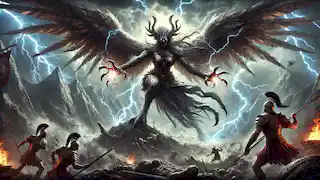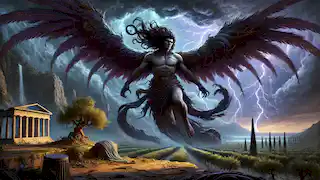In the ancient and mystical landscapes of Greece, among towering cliffs and amidst the whispering of olive trees, there was a tale that sent shivers down the spines of mortals and gods alike: the legend of the Harpy. Known as vengeful creatures with the faces of women and bodies of monstrous birds, harpies were the embodiment of storm winds, carrying with them despair and punishment. But one harpy, more cunning and feared than others, rose above all. Her name was Celaeno, and she would go on to shape the destinies of many, immortalizing her tale in the annals of Greek myth. This is her story, a harrowing saga of curses, betrayal, and, surprisingly, redemption. Celaeno was born under an ominous sky, her first cries merging with the roar of thunder as if nature itself was warning the world of her arrival. As the daughter of Thaumas, the god of sea wonders, and Electra, a daughter of the titan Oceanus, Celaeno inherited the elemental might of the sea and the raw, untamed force of the skies. Her family, comprising her sisters Aello and Ocypete, each had their own wild nature, yet Celaeno was different. She possessed an intensity that made her both revered and feared. As young harpies, the sisters were curious about their world, roaming freely between cliffs and tempestuous clouds. However, from an early age, Celaeno displayed a strange fascination with mortal affairs. Unlike her sisters, who were content in their dominion of sky and storm, Celaeno would often descend to the mortal world, observing humans from afar. Her piercing gaze studied their villages, their gods, and, above all, their unending struggles. Yet, her fascination was tinged with disdain. She saw mortals as weak and undeserving of the gods' blessings. This disdain festered within her, turning to contempt and ultimately manifesting in dark storms that Celaeno herself would unleash on villages. Mortals would look up to the skies, screaming her name, their voices swallowed by the relentless winds. The harpy of darkness, they called her, the embodiment of retribution from the gods. It was during these early days that Celaeno's legacy as a harbinger of doom began to take shape. Celaeno’s reputation soon caught the attention of Zeus himself. The King of the Gods, though often capricious in his own ways, did not take kindly to the interference of lesser beings with his creation. He summoned Celaeno to Olympus, where the great god’s fury echoed like thunder across the heavens. Standing before the might of Zeus, Celaeno felt an unfamiliar sensation—a tremor of fear. Yet, her defiance remained unbroken. "Why do you rain despair upon my creations?" Zeus demanded, his voice a fierce storm in its own right. "I merely bring them what they deserve," Celaeno responded, her voice a low, menacing hiss. Her lack of remorse only fueled Zeus's anger. In a flash, he condemned her to a life of eternal suffering, cursing her to roam the mortal world endlessly, without rest or peace. Her wings, once symbols of freedom, would now carry her only to places of sorrow and despair. And worst of all, she would bear witness to every cry of anguish her storms unleashed. Celaeno's punishment was more severe than she could have anticipated. She became a servant to the misery she had once inflicted upon others, her own life tethered to the mortals she loathed. With each passing year, she began to feel the weight of their sorrow, seeping into her very bones. Years passed, and Celaeno’s hatred for mortals waned, replaced instead by a hollow, unending sadness. Her wings grew heavy with the burden of her curse, and her once fierce gaze softened as she watched humanity struggle against the storms she was compelled to unleash. For the first time, she began to see the resilience within them, the courage that emerged even in the face of insurmountable odds. One winter’s night, Celaeno found herself drawn to a small village nestled in the mountains. She observed the villagers as they huddled together, singing songs and sharing what little warmth they had. In their eyes, she saw hope and a fierce determination to endure. In a moment of unexpected compassion, she stilled the winds, allowing the village a night of peace. From that night on, Celaeno found herself returning to that village, watching over its people as they toiled and thrived, despite their hardships. Her storms became less frequent, and when they did arrive, they were gentler, less destructive. The villagers began to speak of a mysterious protector in the skies, a spirit who tempered the fury of the storms. Among them was a young woman named Lysandra, whose voice carried through the night like a beacon. Her courage and kindness reminded Celaeno of the light she had once thought extinguished in humanity. Drawn to Lysandra, Celaeno dared to reveal herself one night, descending in her full harpy form. Though frightened, Lysandra did not flee. Instead, she approached Celaeno with curiosity and a gentle acceptance that surprised them both. Thus began an unlikely friendship between the harpy and the mortal, one that would forever alter Celaeno’s path. In Lysandra’s presence, Celaeno found a strange peace, a respite from the curse that had bound her. But peace was not a luxury the cursed could afford. One evening, Celaeno returned to the village to find it ravaged, its people scattered and broken. A powerful warlord, seeking to conquer the region, had pillaged the village in her absence. In the ruins, Celaeno found Lysandra, gravely wounded but still alive. Fueled by an unquenchable rage, Celaeno summoned a storm unlike any she had ever unleashed. Her curse lifted for that brief moment, allowing her to wield her powers freely. She tore through the ranks of the warlord’s army, her shrieks echoing through the mountains as she exacted her vengeance. The earth trembled beneath her fury, and not a single soldier escaped her wrath. When the storm settled, Celaeno returned to Lysandra’s side, cradling the dying woman in her arms. Lysandra’s voice, barely a whisper, spoke words of gratitude, not for the destruction Celaeno had wrought, but for the moments of peace they had shared. In Lysandra’s final moments, Celaeno understood the depth of human resilience and love. She felt a profound loss, not only for her friend but also for the part of herself that had learned to care. With Lysandra gone, Celaeno felt the weight of her curse return, heavier than before. Yet, something within her had changed. Her heart, once a tempest of rage and disdain, had softened. She resolved to protect humanity, not as a monster of punishment, but as a guardian who understood both the strength and fragility of mortal life. Celaeno’s storms took on a different purpose; they became warnings of impending danger or shields against greater threats. The people came to know her as a spirit of the skies, a mysterious force that both punished and protected. As centuries passed, the tales of Celaeno the harpy evolved, painting her not as a harbinger of doom, but as a tragic figure, a protector who had once known the pain of loss. The gods themselves grew silent, acknowledging the transformation in one of their cursed creatures. Even Zeus, the source of her punishment, watched with a grudging respect as Celaeno used her curse to serve a higher purpose. In the twilight of her existence, Celaeno’s tale was no longer one of darkness but of redemption. Her story spread across Greece, inspiring poets, artists, and musicians to capture her journey from wrath to compassion. She became a symbol of change, a reminder that even the fiercest storm could be tempered by understanding and love. One evening, as she watched over a peaceful village nestled in a valley, Celaeno felt a presence beside her. Hermes, the messenger god, appeared, his expression unusually somber. "The gods have seen your transformation," he said, his tone gentle. "Zeus has agreed to release you from your curse, Celaeno." For the first time in centuries, Celaeno felt a weight lift from her wings. She was free. Yet, the knowledge of her past deeds lingered, a reminder of the darkness she had once embraced. "Tell Zeus," she replied, her voice soft, "that I accept my freedom, but I will not leave this world. There is still work to be done." With those words, Celaeno took to the skies, her wings carrying her not as a monster, but as a protector—a harpy reborn. And so, Celaeno continued to roam the heavens, her storms now blessings of rain for the fields or protective tempests against intruders. The people revered her, not as a fearful omen but as a mysterious guardian watching over them. Her story lived on, whispered from one generation to the next, a tale of transformation, loss, and redemption. In the hearts of the people, Celaeno was more than a harpy; she was a symbol of the strength that arises from compassion and the courage to change. Her legend endured, a testament to the complexity of both gods and mortals, and the power of a heart transformed by love.The Birth of the Storm

A Curse from Olympus
The Mortal Connection

Betrayal and Wrath
A New Purpose

Redemption and Legacy

The Story of the Harpy
Reading Time: 8 min

About Story: The Story of the Harpy is a Myth Stories from greece set in the Ancient Stories. This Dramatic Stories tale explores themes of Redemption Stories and is suitable for All Ages Stories. It offers Cultural Stories insights. From vengeance to redemption, a harpy’s tale of transformation.
















